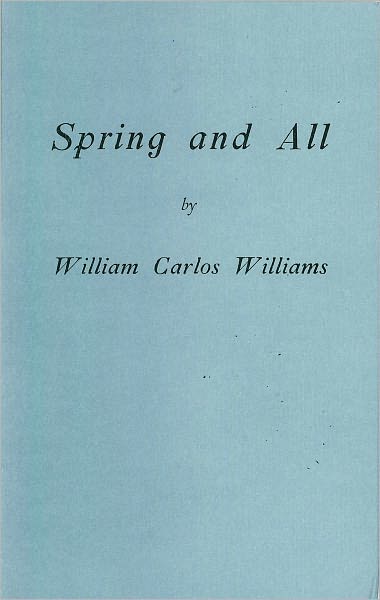.
.
Spring and All was first published in France in 1923 in an edition of 300 copies. Years later Wallace reflected on the book’s nonchalant, playful debut:”‘Nobody ever saw it — it had no circulation at all — but I had a bit of fun with it … Chapter headings are printed upside down on purpose, the chapters are numbered all out of order, sometimes with Roman numerals, sometimes with Arabic, anything that came in handy” (I Wanted to Write a Poem, pp. 36-37).
If you covet a one of those first edition copies, in fine condition, be prepared to shell out a thousand dollars or more.
The book’s contents have reappeared in subsequent Williams compendiums, but for those of you with a book collector’s sensibility, and for poetry readers who seek transport back to an earlier cultural era via the objects of that era (test: were you wide-eyed drinking in the set designs in Woody Allen’s “Midnight in Paris”?), this facsimile edition is the next best thing to holding the original.
In the decades since its original publication there’s been no shortage of sophisticated critical analysis of the meaning and significance of SPRING AND ALL. My amateur thoughts include a belief that the book’s once unorthodox mixture of prose and poetry sections has less power to bother readers of today. In the prose sections I grew to appreciate the gaps, the churn, the elisions, the introduction and abandonment of thoughts: we are witnessing a mind doing its work. When Williams delivers fully formed thoughts his breathing is apparent: I heard not the nervous, arhythmic and shallow breaths of today but the inhalations and exhalations of an earlier America, deep and full and sufficient to the ideas whose communication they carry.
I happen to like his use of commas.
There are stretches that have a dated feel (remember, the freshest cataclysm infecting Williams’ world view was The Great War) and some of his affections are now obscure (how many know who Dora Marsden was; or Alfred Kreymborg, whose writing Williams declares “still has value and will tomorrow have more”?). But hail the author’s ready audacity, as when he draws a broad conclusion about modern art trends by looking at a reproduction of a single painting by Juan Gris — and that reproduction not in color but in black and white! Especially in its epigrammatic statements on art and life, there is an affinity between Spring and All and Robert Henri’s The Art Spirit.
You reach page 74, Chapter XXII. You pause. It’s as if you’ve been meandering down a museum’s long corridor of displays of things interesting and things not so interesting and then you’re directed into an intimate side-room and brought face to face with a solitary object that hits you, your eye, your mind, with unexpected force: a sixteen-word poem about a red wheel barrow whose haiku economy proceeds to gestate in your presence.
To speak of the book itself, as physical object: it is sure to please. More meaty than the proverbial slim volume of poetry (it’s over 100 pages), this facsimile is finely constructed with clearly printed text on cream paper, wrapped in powder blue-gray covers that have a mysterious, sensuous, suede-like feel.
Williams writes: “The better work men do is always done under stress and at great personal cost.”
Let this better work be your pleasure.
.
A version of this review appears on Amazon, here.
